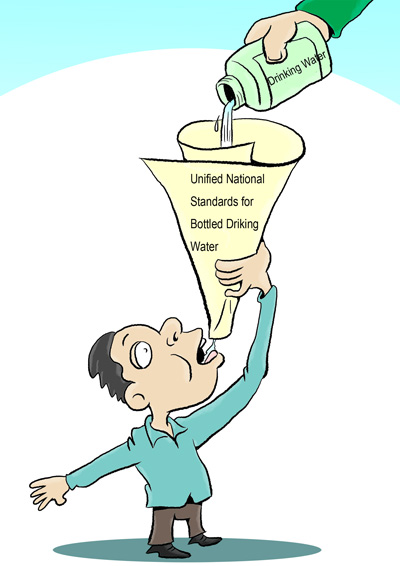|
 |
|
(CFP) |
Nongfu Spring ranks stably in the top three in China's bottled water market. Statistics from ACNielsen show that in 2012 Master Kong, Nongfu Spring, Cestbon and Coca Cola accounted for 22.6 percent, 21.8 percent, 8.5 percent and 7.9 percent of the bottled water market respectively.
However, the new scandal over water quality may be a game changer. Both Nongfu Spring and Cestbon label products with weak alkaline water, and target the medium and high-end market. Before April 10, Nongfu Spring was expanding a growth rate of 30 percent. But now, its sales have plunged or even come to a halt in some Beijing supermarkets. On April 11, Nongfu Spring alleged that Cestbon Food & Beverage (Shenzhen) was behind the negative reports by repeatedly drawing attention to its previous scandals, including one in 2009 involving high levels of arsenic components in its products.
Who to blame
No matter who is behind the water wrangle, one thing is certain: the time for a unified national standard on drinking water is long overdue.
Bottled-water companies in China adopt a variety of standards, including national standards made by different ministries, standards made by local governments, and those made by the companies themselves. This creates confusion among the public and makes it difficult for food authorities to supervise quality, said Dong Jinshi, Vice Chairman and Secretary General of the International Food Packaging Association, in an interview with The Beijing News.
On May 3, the China National Center for Food Safety Risk Assessment announced that it would speed up the process of consolidating standards on bottled water.
Currently, it isn't clear whether the Beijing Municipal Administration of Quality and Technology Supervision had ordered Nongfu Spring to suspend production, but it appears that customers have already made up their mind regarding the product. That being said, consumer rights activists say the current debate has been over standards and not quality, which is more related to health, a blatant slap in the face of consumer rights.
"Everyone is a water consumer. If the incident fails to arouse a sense of urgency and conscience among authorities, the public would have the wrong impression about drinking water in China," said Liu Junhai, Vice Chairman of the China Consumers' Association.
From debates on milk production standards to water quality and more, Chinese consumers have had their share of never-ending food and drink scandals.
"It's always the case. You consume a self-professed safe product, which someday you may be told is not as healthy and safe as advertised," said He Fang, a young office worker who pays close attention to and follows media reports on food safety. "Only then it's too late to spit it out."
Email us at: dengyaqing@bjreview.com | 